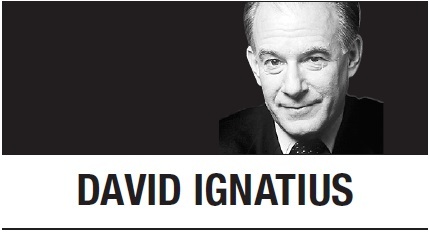
You could say many things to describe a week in which President Trump got in a snit about buying Greenland, called the Federal Reserve chairman an “enemy,” reversed his position repeatedly on China and rebuffed European allies by saying he’s ready to invite Russia to a global summit at one of his Florida golf resorts.
But “exhausting” would be the word at the top of my list after Trump’s whirling-dervish performance. Yes, I’m shocked, confused, sometimes indignant about his erratic policy statements. But there’s a deeper feeling that others may share: I’m tired of Trump’s antics. They take up too much emotional space. Every day, there’s a new narcissistic boast, a new lie to correct, a new violation of what people used to call presidential “decorum.”
Trump seems to love each manic minute. He craves the chance to command the public spotlight. He has two main foils in his daily extravaganza: the news media (“Fake News!”) and liberal Democrats (especially ones of color) whom he baits every chance he gets. It’s a stand-up comedy of insults more than a presidency.
But every performer knows the cruel truth: The public eventually gets bored with even the most novel act. It takes ever-greater energy to produce the same shock value. A veteran like Trump surely understands the Hollywood reality that today’s star becomes tomorrow’s has-been. With cruel speed, the cycle goes from “You gotta get me Donald!” to “Who’s Donald?” That’s not a political judgment; it’s just show biz.
Data gives a hint of this Trump fatigue. His popularity remains low, with just a 41.5 percent average approval rating, according to the website FiveThirtyEight, and it hasn’t budged much for the last year. Trump’s tweets get less than half as many interactions (retweets plus likes) as they did in early 2017, according to an analysis by the analytical firm CrowdTangle, cited in May by Axios.
And Trump’s Twitter impact is less than the public furor (and his 63.6 million official followers) suggests. A recent Gallup poll found that only 8 percent of US adults who have a Twitter account say they follow Trump’s account and only 4 percent say they regularly read it.
Trump is catnip for political junkies, but even here the appeal may be fading. According to an analysis of roughly 3,000 websites by the analytics firm Parse.ly, the demand for political stories about Trump (measured by average views per post about him) declined 37.8 percent in the first six months of 2019 from its level in the six months after his inauguration, said Kelsey Arendt, a senior data analyst with Parse.ly.
Trump fatigue is a subset of a deeper public disaffection with politics itself, and news about it. Everybody’s always squawking in the age of Trump, and pollsters find that the public increasingly is tuning out. The louder the argument, the more people seem to distrust the news organizations that amplify the intensely partisan debate.
This news overload was described by the Pew Research Center in polling released in June 2018. Pew found that 68 percent of those polled described themselves as “worn out by the amount of news.” The demographic breakdown was fascinating: More Republicans expressed fatigue than Democrats; more whites than blacks; more women than men; more college graduates than those with a high-school education.
Interestingly, among age groups, respondents over 65 had the largest percentage of those who “like the amount of news” they’re getting.
The fatigue factor is also clear in a Pew poll of social media users released earlier this month. Asked if they were “worn out by how many political posts and discussions they see,” nearly half (46 percent) said yes. The numbers were roughly the same for men and women and old and young, but Republicans were more “worn out” than Democrats, and whites were significantly more so than nonwhites.
As Trump-era politics get noisier, a weary public seems to be tuning out. What are the political implications of this trend as we head toward the 2020 presidential election? Certainly, turnout will be critical; motivated voters will drive the outcome in a country that’s turned off by politics.
But who’s the Trump defuser? Who can calm a country that has frazzled nerves from the daily Trump barrage? The best candidate, in theory, would be someone who promises to restore sanity, fairness and national unity.
But that’s a high bar. Any Democrat who can win the nomination will probably sound shrill to many Republicans. In the angry scrum of American politics, the sensible center seems as mythical as Camelot.
David Ignatius
Follow David Ignatius on Twitter: @IgnatiusPost -- Ed.
(Washington Post Writers Group)








